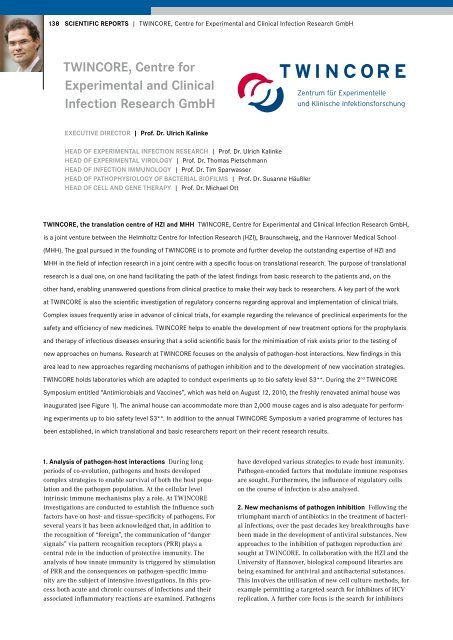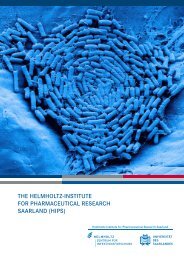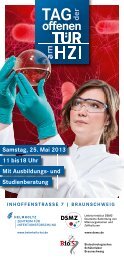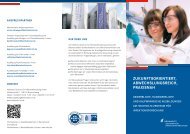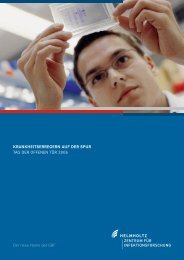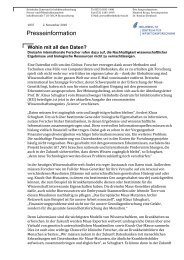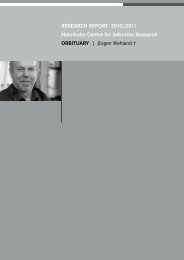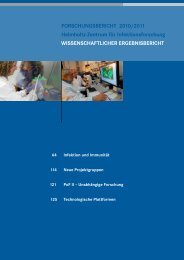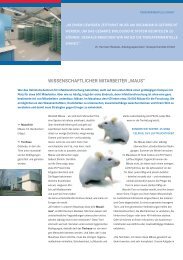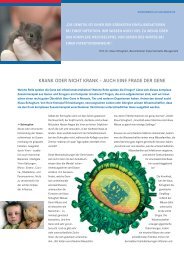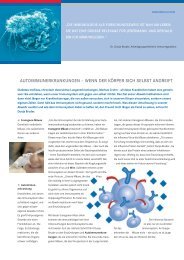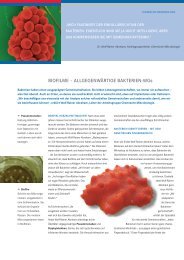Research Report 2010 2011 - Helmholtz-Zentrum für ...
Research Report 2010 2011 - Helmholtz-Zentrum für ...
Research Report 2010 2011 - Helmholtz-Zentrum für ...
You also want an ePaper? Increase the reach of your titles
YUMPU automatically turns print PDFs into web optimized ePapers that Google loves.
138<br />
SCIENTIFIC REPORTS | TWINCORE, Centre for Experimental and Clinical Infection <strong>Research</strong> GmbH<br />
TWINCORE, Centre for<br />
Experimental and Clinical<br />
Infection <strong>Research</strong> GmbH<br />
EXECUTIVE DIRECTOR | Prof. Dr. Ulrich Kalinke<br />
HEAD OF EXPERIMENTAL INFECTION RESEARCH | Prof. Dr. Ulrich Kalinke<br />
HEAD OF EXPERIMENTAL VIROLOGY | Prof. Dr. Thomas Pietschmann<br />
HEAD OF INFECTION IMMUNOLOGY | Prof. Dr. Tim Sparwasser<br />
HEAD OF PATHOPHYSIOLOGY OF BACTERIAL BIOFILMS | Prof. Dr. Susanne Häußler<br />
HEAD OF CELL AND GENE THERAPY | Prof. Dr. Michael Ott<br />
TWINCORE, the translation centre of HZI and MHH TWINCORE, Centre for Experimental and Clinical Infection <strong>Research</strong> GmbH,<br />
is a joint venture between the <strong>Helmholtz</strong> Centre for Infection <strong>Research</strong> (HZI), Braunschweig, and the Hannover Medical School<br />
(MHH). The goal pursued in the founding of TWINCORE is to promote and further develop the outstanding expertise of HZI and<br />
MHH in the fi eld of infection research in a joint centre with a specifi c focus on translational research. The purpose of translational<br />
research is a dual one, on one hand facilitating the path of the latest fi ndings from basic research to the patients and, on the<br />
other hand, enabling unanswered questions from clinical practice to make their way back to researchers. A key part of the work<br />
at TWINCORE is also the scientifi c investigation of regulatory concerns regarding approval and implementation of clinical trials.<br />
Complex issues frequently arise in advance of clinical trials, for example regarding the relevance of preclinical experiments for the<br />
safety and effi ciency of new medicines. TWINCORE helps to enable the development of new treatment options for the prophylaxis<br />
and therapy of infectious diseases ensuring that a solid scientifi c basis for the minimisation of risk exists prior to the testing of<br />
new approaches on humans. <strong>Research</strong> at TWINCORE focuses on the analysis of pathogen-host interactions. New fi ndings in this<br />
area lead to new approaches regarding mechanisms of pathogen inhibition and to the development of new vaccination strategies.<br />
TWINCORE holds laboratories which are adapted to conduct experiments up to bio safety level S3**. During the 2 nd TWINCORE<br />
Symposium entitled “Antimicrobials and Vaccines”, which was held on August 12, <strong>2010</strong>, the freshly renovated animal house was<br />
inaugurated (see Figure 1). The animal house can accommodate more than 2,000 mouse cages and is also adequate for performing<br />
experiments up to bio safety level S3**. In addition to the annual TWINCORE Symposium a varied programme of lectures has<br />
been established, in which translational and basic researchers report on their recent research results.<br />
1. Analysis of pathogen-host interactions During long<br />
periods of co-evolution, pathogens and hosts developed<br />
complex strategies to enable survival of both the host population<br />
and the pathogen population. At the cellular level<br />
intrinsic immune mechanisms play a role. At TWINCORE<br />
investigations are conducted to establish the influence such<br />
factors have on host- and tissue-specificity of pathogens. For<br />
several years it has been acknowledged that, in addition to<br />
the recognition of “foreign”, the communication of “danger<br />
signals” via pattern recognition receptors (PRR) plays a<br />
central role in the induction of protective immunity. The<br />
analysis of how innate immunity is triggered by stimulation<br />
of PRR and the consequences on pathogen-specific immunity<br />
are the subject of intensive investigations. In this process<br />
both acute and chronic courses of infections and their<br />
associated inflammatory reactions are examined. Pathogens<br />
have developed various strategies to evade host immunity.<br />
Pathogen-encoded factors that modulate immune responses<br />
are sought. Furthermore, the influence of regulatory cells<br />
on the course of infection is also analysed.<br />
2. New mechanisms of pathogen inhibition Following the<br />
triumphant march of antibiotics in the treatment of bacterial<br />
infections, over the past decades key breakthroughs have<br />
been made in the development of antiviral substances. New<br />
approaches to the inhibition of pathogen reproduction are<br />
sought at TWINCORE. In collaboration with the HZI and the<br />
University of Hannover, biological compound libraries are<br />
being examined for antiviral and antibacterial substan ces.<br />
This involves the utilisation of new cell culture methods, for<br />
example permitting a targeted search for inhibitors of HCV<br />
replication. A further core focus is the search for inhibitors


